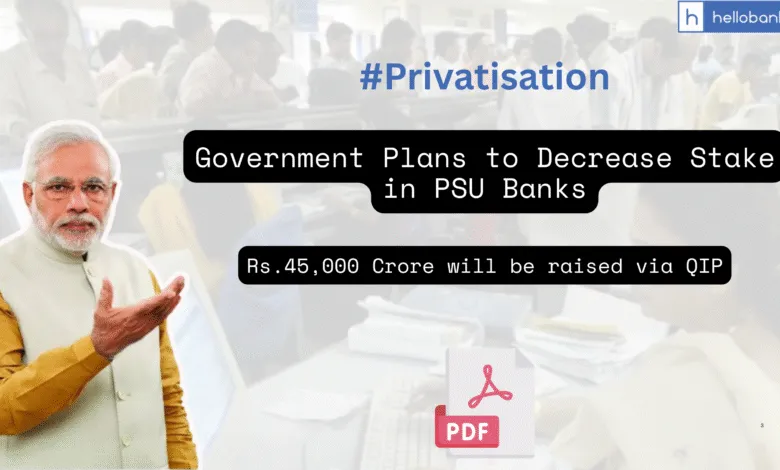Government Plans to Decrease Stake in PSU Banks, Rs.45,000 Crore will be raised via QIP

Indian government-owned banks are planning to raise around ₹45,000 crore (about $5.25 billion) by selling shares to large investors during the financial year 2025–26. This will be done through a process called Qualified Institutional Placement (QIP), according to a senior government official. [Click here to understand QIP in simple language]
The State Bank of India (SBI), which is the largest bank in the country by total assets, will also soon launch its QIP. Earlier in May, SBI had already approved plans to raise ₹25,000 crore in equity capital during this year.
The government also plans to complete the sale of its stake in IDBI Bank by October 2025. This is part of its larger plan to reduce its holding in certain public sector banks and generate funds.
In addition to IDBI Bank and SBI, the government is also preparing to sell shares in the following banks during this financial year:
- UCO Bank
- Bank of Maharashtra
- Central Bank of India
- Punjab & Sind Bank
- Indian Overseas Bank
Right now, the Government of India has following stake in Public Sector Banks:
| Bank Name | Government of India’s Stake |
|---|---|
| Bank of Maharashtra | 86.46% |
| Indian Overseas Bank | 96.38% |
| UCO Bank | 95.39% |
| Central Bank of India | 93.08% |
| Punjab and Sind Bank | 98.25% |
These stake sales are expected to help the government raise additional funds and increase private participation in public sector banks.
The groundwork and planning will take place during FY 2025-26 while the actual stake sales are expected to begin in FY 2026-27.
In the Union Budget for this year, Prime Minister Narendra Modi’s government had announced that it aims to raise ₹47,000 crore through the sale of its stakes in public sector companies and by monetising government assets.
According to sources, a group of ministers and top bureaucrats — called the Inter-Ministerial Group (IMG) — met on 8th July to appoint both technical and legal advisers for the stake sale. This group was co-chaired by the Department of Financial Services (DFS) and the Department of Investment and Public Asset Management (DIPAM).
Earlier, the government had announced that only 4 public sector companies in strategic sector will remain under government control and rest all will be privatised.
Is it a reason to Worry?
While divestment of stake is not actually considered privatisation, but it eventually leads to privatisation. It slowly and slowly leads to privatisation. The stake of government will be purchased by the private individuals/entities which will lead to decrease in ownership of the government. If more divestment is done, the ownership of government will further decrease and if ownership of government falls below 51%, the bank will be privatised. Moreover, even if Government keep 51% stake with itself, the remaining 49% stake goes to private entities and these private entities try to impose their rules and regulations which ultimately leads to introduction of private culture in a government organisation.
